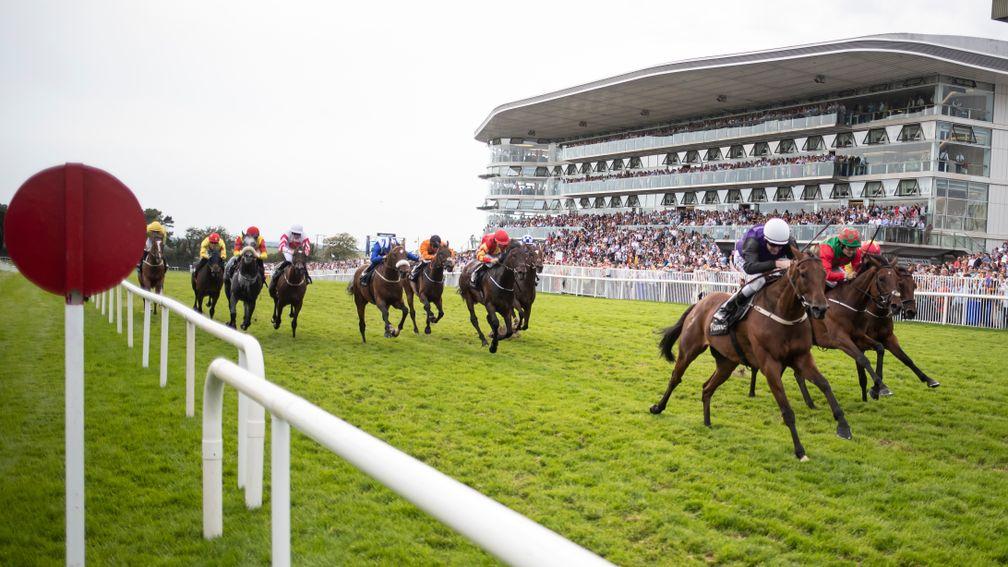- More
Hammer blow for Galway as festival is forced behind closed doors for 2020

A ban on mass gatherings in Ireland has ended hopes of the
seven-day Galway Festival, worth €54 million to the local economy, taking place as anything other than an event behind closed doors.
Racecourse manager Michael Moloney on Tuesday accepted its showpiece 2020 festival will be crowd-free in light of the Irish government's announcement that gatherings of 5,000 or more people are to be banned until September 1. A subsequent statement confirmed the strategy.
The seven-day bonanza at Ballybrit, where about 1,500 are employed on site for the week, is due to kick off on Monday, July 27.
Moloney had been hoping that the Covid-19 restrictions might have eased in time for the highlight of the summer racing season in Ireland, but he conceded that the meeting going ahead behind closed doors had become the best possible outcome.
Moloney said: “We have been liaising with Horse Racing Ireland closely over the past few weeks but obviously this is fresh information.
“We have always said that if there were restrictions put in place we would certainly comply with them.”
He added: “I know Horse Racing Ireland is working on the plan for the resumption of racing behind closed doors and hopefully we will still be in a position to do that in order to support the industry and the vast number of people who make their living from it.”
The statement that followed confirmed that the meeting would not be open to the public, seemingly quashing any prospect of it going ahead with a reduced capacity.
Read the full Galway statement here
Last year marked the 150th anniversary of the Galway festival, when attendance across the seven days was just shy of 130,000, with €6.8m traded in the bookmakers' ring.
While the prospects of running the festival for the first time behind closed doors is a crippling blow to the track, Moloney insists that the devastation caused by the coronavirus pandemic puts the potential loss into perspective.
Moloney said: “It will be a huge disappointment. There are a huge amount of racegoers who come here every year and make the Galway festival an annual event. But we need to be conscious about what's going on around the world and think of all the people that this pandemic has affected through the loss of life. But certainly it would be a big disappointment if this is the case.”
Admission costs for the week-long fixture vary, but at an average of around €20, the revenue from gate fees alone works out at around €2.5m. Holding the fixture behind closed doors would be estimated to cost the track around €3m in terms of lost revenue.
On Tuesday, a further 44 people who had been diagnosed with Covid-19 were reported to have died in Ireland, taking the total figure to 730, with an additional 108 deaths classified as possible Covid-19 related but not confirmed by a laboratory.
The number of newly confirmed coronavirus cases is 388, bringing the overall number in Ireland to 16,040.
Read more
Efforts to resume racing as soon as possible are on a knife-edge says BHA chief
Lockinge 'unlikely' to happen in May and could be first Group 1 to be cancelled
Culture secretary defends decision for Cheltenham Festival to go ahead
A primetime Derby could provide a silver lining for racing in the current crisis
Place bets on international races with the Racing Post app. Log in to your bookmaker accounts in the Accounts tab in the bottom right and then click cards to view the racecards
Published on inCoronavirus
Last updated
- 'We might be surprised about the racecourses that go - it's a precarious time'
- 'It's not all doom and gloom' - the long-term future of racehorse ownership
- Hysteria and dizzying change the only certainties for an industry under fire
- 'It will recover, it's only a question of when and how many casualties'
- 'I think we'll end up with fewer trainers than we've had for a long time'
- 'We might be surprised about the racecourses that go - it's a precarious time'
- 'It's not all doom and gloom' - the long-term future of racehorse ownership
- Hysteria and dizzying change the only certainties for an industry under fire
- 'It will recover, it's only a question of when and how many casualties'
- 'I think we'll end up with fewer trainers than we've had for a long time'